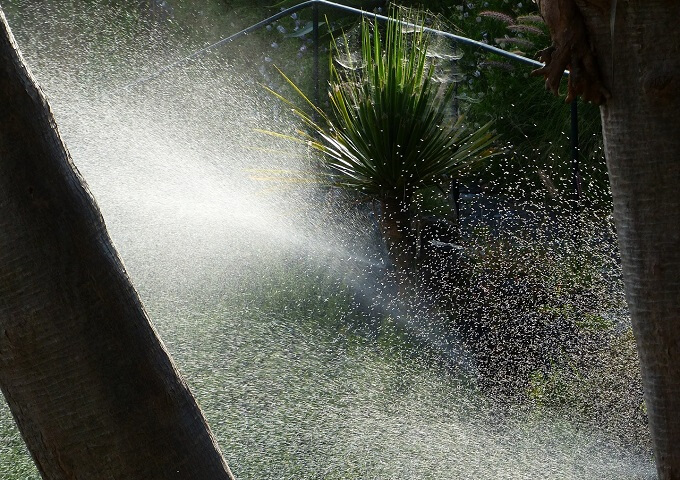It’s no secret that we have been putting immense pressure on our planet over the last few decades; global warming and water shortages are now a global issue and more people are trying to adjust their habits to become more environmentally conscious.
California has been particularly hard hit by weather changes and it has been plagued by drought and wildfires for the last five years. This is no more evident than in Central Valley, which has seen much of the previously farmed land left bare due to water restrictions.
This change is clearly evident in the landscaping industry too, as many people start to look for environmentally friendly options for their gardens. From mulching to pruning and planting to maintaining there has been an evolution of processes and equipment that are as water-wise as possible.
Ensuring that you have the right irrigation system for your commercial property is tantamount to making your garden is as drought resistant as possible. In California especially, the correct irrigation system can make or break for your commercial property and could be the factor that helps your garden survive the drought.
There are two main types of irrigation systems used on commercial properties: drip irrigation and spray irrigation. In this blog post, we will be discussing the pros and cons of each system to help you decide which form of irrigation is best suited to your property.
Drip Irrigation System
Drip systems are a concentrated form of irrigation system, which is also known as micro-irrigation. Water is moved around the landscape in small tubes and is controlled by series of valves and regulators that help keep it a low-volume form of irrigation.
Water is delivered straight to the intended area and it then drips onto the root system and soil surface. Subsurface drip irrigation is simply when the tubing is placed underground and the water is delivered below the surface.
Benefits of drip irrigation
You can install drip irrigation in both new and established gardens, and it has a much higher rate of efficiency, as there is less evaporation and water wastage. These are some of the other great benefits of having a drip irrigation system put into your commercial property:
- Hard to reach and strangely shaped gardens can be easily irrigated,
- Uniform water dissemination,
- Much less soil erosion,
- Less fertilizer run-off,
- Decreases chances of disease as the leaves of the plant seldom come into contact with water.
- Using drip prevents overspray that can, over time damage the asphalt, windows, or siding on your home
Disadvantages of drip irrigation
Like anything else in life, there are some cons to having a drip irrigation system, however, we feel that the pros certainly outweigh them.
- Strong sunlight can damage tubing above the ground,
- Without proper filtration systems, the tubes tend to get blocked,
- Can’t use the system for frost control,
- It can be difficult to cover large areas of lawn.
- Drip systems can be damaged by rodents,foot traffic, or pruning tools
- Difficult or more time consuming to check the system once plant material has matured
Spray Irrigation System
The spray irrigation system is pretty much the complete opposite of the drip system. Water is sprayed out through tubes and sprinklers using valves and nozzles, which spread the water into a fine spray that emulates natural rainfall. It is one of the most common forms of irrigation and is used in many commercial property landscapes.

Advantages of spray irrigation
One of the greatest things about spray irrigation is that they are easily adjustable and the spray often attracts birds and other small creatures that cool off in the droplets. These are some of the many benefits of having a spray irrigation system:
- It emulates and makes a great supplement for natural rainfall when it is short,
- Spray irrigation can cover big surfaces and is suited well to watering lawns and other open areas,
- Spray patterns can be adjusted to suit the needs of that particular area of the garden,
- New technology and smart irrigation can be easily implemented and used.
- Spray systems make it easy to check those stressed areas in your landscape
Disadvantages of spray irrigation
While spray irrigation systems are highly effective and popular, they do need to be installed and calibrated by professionals to ensure that you get the best out of them. These are some of the few disadvantages of installing a spray system on your commercial property:
- Higher levels of water loss from evaporation than drip systems,
- Water can be lost through interference from wind,
- If not installed properly, mature plants can block spray for other plants,
- Moisture on the leaves of plants can increase the risk of disease or even sunscald
So, would your commercial property benefit from installing a drip system? Or perhaps upgrading your sprinkler system to a more technologically advanced smart system? The correct irrigation can really make a massive difference in the quality of your property’s garden and its ability to withstand the soaring temperatures and lack of rain that California is currently experiencing.
Irrigation is just one of the many things to consider when thinking about landscaping for your commercial property. Combined with the correct water-wise garden solutions and expert advice – you should be able to create a landscape that will survive a drought, without compromising on the aesthetic appeal of the garden.
Download our Landscape Maintenance Guide for a Commercial Property Owner to find out more about irrigation and other essential factors that will ensure a happy, healthy garden.


